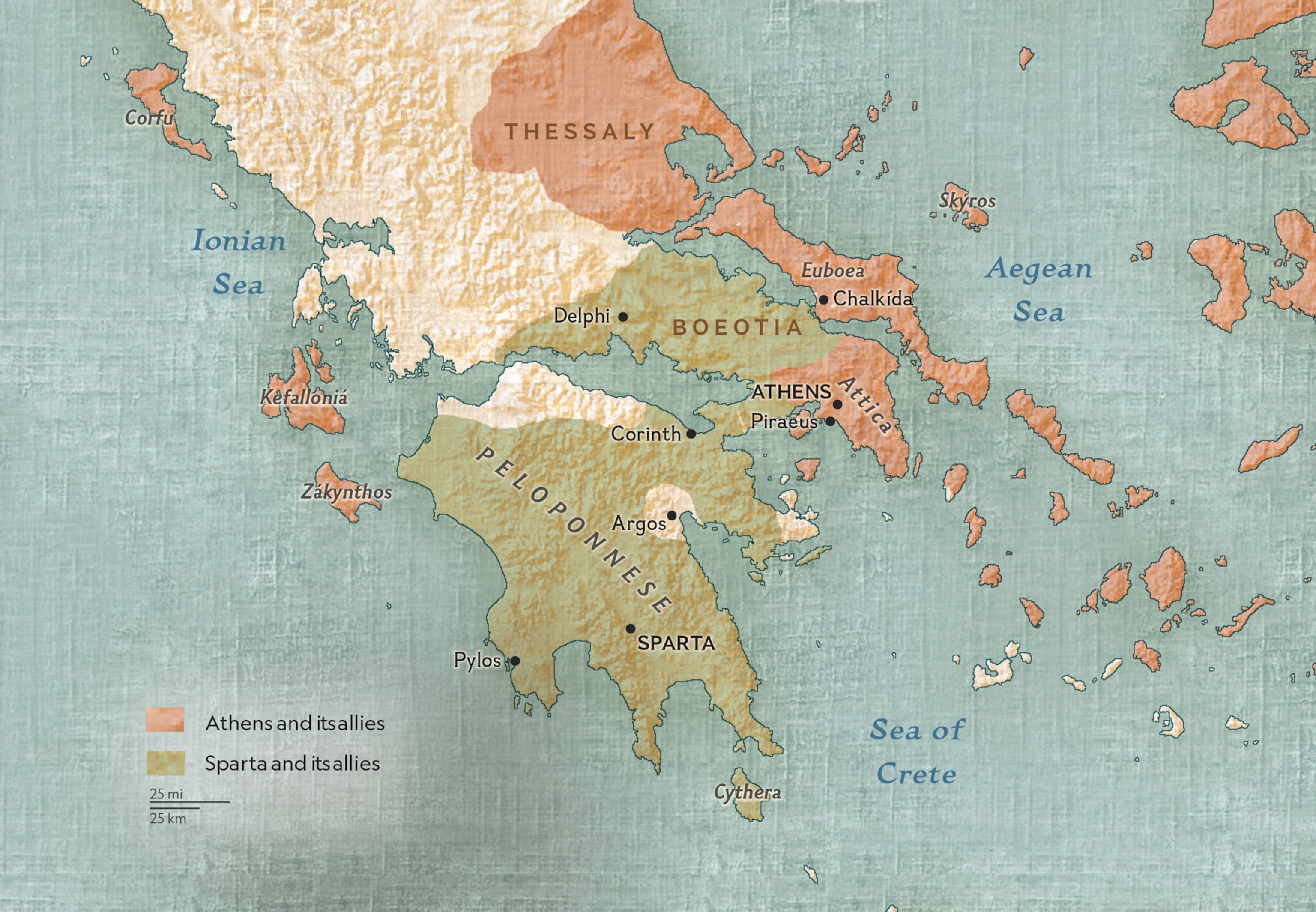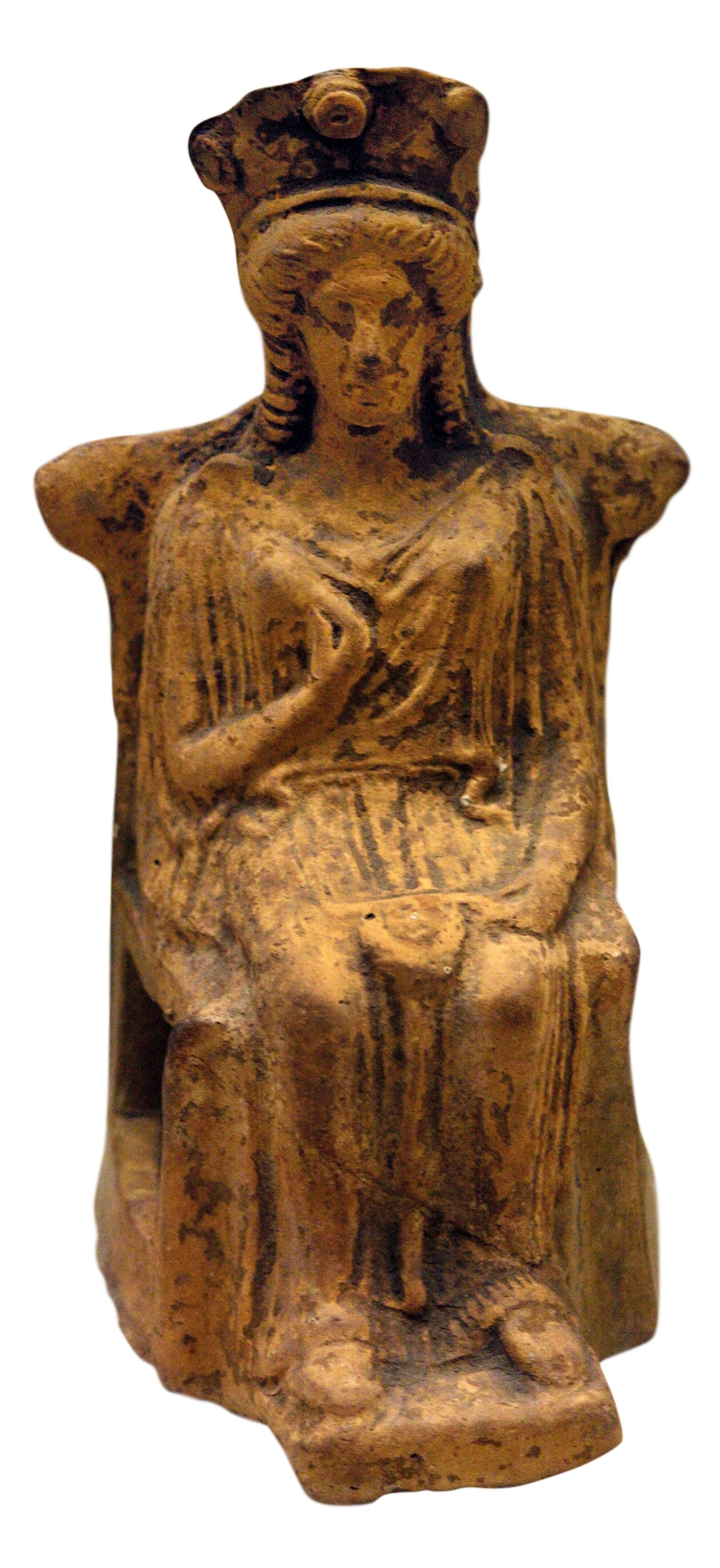
The Plague of Athens killed tens of thousands, but its cause remains a mystery
Killing nearly a third of the population, an epidemic ripped through Athens in 430 B.C. Historic accounts and new technology are helping identify the true culprit.
Two of the most powerful city-states in ancient Greece—Sparta and Athens—went to war in 431 B.C. Tensions between the two had been simmering for decades before boiling over into war. Occupying the lands of the Peloponnese (mainland Greece’s southern-most peninsula), Sparta enacted a land-based strategy, relying on their disciplined hoplites to defeat the Athenians in the open field. When Spartan troops would invade Attica (the peninsula where Athens and its allies were located), Athenians responded with naval attacks on politically sensitive points in the Peloponnese. Rural populations in Attica would be forced to take refuge within Athens’s city walls when Sparta invaded.

The Peloponnesian War would end by fundamentally shifting power in the Mediterranean, but neither Athens’s navy nor Sparta’s soldiers could claim to be the determining factor of the conflict. That honor belongs to an event that nobody could have predicted or planned for: the plague of Athens, which broke out in the war’s second year. A medical mystery to this day, this ancient epidemic would be the most influential factor to shape the war and decide which city-state would be the final victor.
Outbreak
In spring 430 B.C. locals in Piraeus, the port area of Athens, began to fall ill with a disease no one had seen before. The malady spread quickly. Reports circulated of similar outbreaks on the island of Lemnos, in the north Aegean, and other locations.

In Piraeus, rumors spread that when the Spartans had arrived they had poisoned the wells there so that Athenians were sickened by drinking contaminated water. In a matter of weeks, the disease had spread to the heart of the city and was affecting people of all ages and backgrounds and in unprecedented proportions. The strategy of the Athenian leader Pericles to bring people from rural Attica into the walled city of Athens, only increased the rate of contagion. The illness, whatever it was, did not affect the Spartans to the same degree as the Athenians. In total, it is estimated that between 25 and 35 percent of the population of Athens would perish as a result of the plague when it ended five years later. (Discover how ancient Sparta created a deadly military machine.)
The main source of information about the epidemic comes from the historian Thucydides, who not only witnessed the events firsthand but survived the disease himself. In his History of the Peloponnesian War, Thucydides believes the plague originated in eastern Africa, in the lands of ancient Ethiopia (present-day Sudan). From there, the sickness traveled north to Egypt and Libya and east to the Persian Empire before reaching Greece.

Early in his account, Thucydides writes: “I shall give a statement of what it was like, which people can study in case it should ever attack again.” His descriptions chart how the disease progressed in its victims, from the first symptoms: “[P]eople in good health were all of a sudden attacked by heats in the head, and redness and inflammation in the eyes, the inward parts, such as the throat or tongue, becoming bloody and emitting an unnatural and fetid breath.” Symptoms included “sneezing and hoarseness” before the disease attacked the chest, causing “a hard cough,” and then the stomach, where it triggered “discharges of bile,” “ineffectual retching,” and “violent spasms.” By this point the victim was in “very great distress.”
Thucydides describes the appearance of the patient’s skin: “reddish, livid, and breaking out into small pustules and ulcers.” Sufferers described intense fevers, feeling as though a fire was consuming them inside, so they would remove all their clothes. They experienced an “unquenchable thirst,” which led some to plunge themselves into water tanks as well. Extreme insomnia followed.
The Horrors of the Plague

Thucydides not only left behind a gift in his descriptions of the plague’s physical symptoms; he also recorded the psychological impact the epidemic had in Athens:
The most terrifying aspect of the whole affliction was the despair which resulted when someone realized that he had the disease: people immediately lost hope, and so through their attitude of mind were much more likely to let themselves go and not hold out . . . [T]he disaster was overpowering, and as people did not know what would become of them, they tended to neglect the sacred and the secular alike. All the funeral customs which had previously been observed were thrown into confusion and the dead were buried in any way possible.
Treating the sick
Thucydides reports that many patients died within seven to nine days of being infected. If they made it through the first stage, they might then suffer severe ulceration of the bowels accompanied by diarrhea; the ensuing weakness generally proved fatal. The main problems in treating the disease was its novelty and its contagiousness. Doctors had never experienced anything quite like it, leaving their expertise powerless against the epidemic. “No remedy was found that could be used as a specific,” writes Thucydides, “for what did good in one case, did harm in another.” Regardless of the treatment given, he writes, “strong and weak constitutions proved equally incapable of resistance, all alike being swept away.”
The contagious disease took a toll on those who cared for the sick. Physicians were badly hit early on. Indeed, anyone who nursed their sick loved ones paid a high price: “[I]f they ventured to do so, death was the consequence.” If they did not, the patients “perished from neglect; indeed many houses were emptied of their inmates for want of a nurse.” Thucydides notes that “it was with those who had recovered from the disease that the sick and the dying found most compassion. These knew what it was from experience.” (Here's why 17th-century plague doctors wore those strange beaked masks.)

Infection seems to have brought with it some immunity: “The same man was never attacked twice—never at least fatally.” Those who had been infected but had come through might experience a brief, euphoric feeling that they could survive anything. Even so, the plague, whatever it was, could leave those who recovered with severe aftereffects. Some people were “seized with an entire loss of memory on their first recovery, and did not know either themselves or their friends.” Many survivors suffered lasting damage to their fingers and toes, genitals, and eyes.
As well as its impact on health, the epidemic caused radical disruption to everyday life for Athenians. According to Thucydides, “the bodies of dying men lay one upon another, and half-dead creatures reeled about the streets.” Corpses piled up and, given the urgency of the situation, there was no time to perform even the most elementary rites when burying the dead. Several bodies would be cremated at the same time on the same pyre. (Medieval burials reveal that pandemics spawned fears of the undead.)
Epic Ailments

Homer’s epic work The Iliad begins with an epidemic that forces the Greek leaders besieging Troy to consider withdrawing their troops. They consult the soothsayer Calchas to find out the cause of the sickness. Calchas tells them the affliction has been sent by Apollo as punishment for an offense committed by Agamemnon, leader of the Greeks. Agamemnon has seized Chryseis, the daughter of a Trojan priest of Apollo, as a war prize and refuses to ransom her back to her father. To end the epidemic, Agamemnon reluctantly returns Chryseis but then takes Briseis, the war prize of Greek hero Achilles, as a replacement. Agamemnon’s petty, short-sighted decision sends Achilles into a rage and sets in motion the great epic’s dramatic events.
Civil unrest
The plague had a radical effect on Athenian society. Traditional hierarchies were turned upside down: Wealthy citizens might see their livelihoods destroyed from one day to the next, while poor ones might get rich by appropriating a dead man’s assets. Thucydides describes how moral conventions were abandoned and people tended to live each day as if it were their last: “[A]s the disaster passed all bounds, men, not knowing what was to become of them, became utterly careless of everything, whether sacred or profane.” Nobody feared justice, as death by plague seemed more imminent than any pending court case.
Spiritual concerns loomed large as well. Many believed something had angered the gods, who unleashed the disease as punishment. According to Thucydides, the elders spoke of an ancient oracle that had predicted a great epidemic would ensue after a “Dorian war”; the Spartans were Dorians, descendants of an ancient people who had settled in the Peloponnese. It was also rumored that the Spartans had consulted the oracle at Delphi about the outcome of the war; through prophecy, the god Apollo had promised his support to Sparta. The Athenians themselves sought counsel of the gods and sent emissaries to Delphi and other sanctuaries for divine guidance on the epidemic.


Overwhelmed by the impact of the plague on their loved ones and on their way of life, Athenians began to turn against their leader, Pericles. While the move may have seemed practical at the time, with hindsight, his war strategy of encouraging the population to shelter from Sparta’s attacks within Athens’s city walls had worsened the sanitary conditions in the city. As Thucydides records:
An aggravation of the existing calamity was the influx from the country into the city, and this was especially felt by the new arrivals. As there were no houses to receive them, they had to be lodged at the hot season of the year in stifling cabins, where the mortality raged without restraint.
Pericles’ political rivals went further, accusing him of calling down the misfortune upon them through his determined support for the war. After more than a decade of often adoring support, Athens turned against Pericles: A heavy fine was levied against him, and he was not reelected as official strategist.
Having been thrown out of office for mishandling the epidemic, Pericles would then suffer the ravages of the disease firsthand. According to the historian Plutarch, Pericles’ eldest son, Xanthippus, who had a rocky relationship with his father, succumbed to the plague, as did Pericles’ sister shortly after. His second son, Paralus, also fell ill and died, a tragedy that ended up breaking the legendary self-control of Pericles, who died from the plague himself in fall 429 B.C.

The epidemic greatly weakened Athens and brought an end to its Golden Age. By the time the plague ended around 425 B.C., it is estimated that nearly a third of the city’s people died, with between 75,000 to 100,000 lives lost. Sparta and Athens would strike a truce around 421 B.C. Sparta would ultimately win the Peloponnesian War, destroying the Athenian fleet at sea in 405.
Mystery malady
Historians have still not identified the epidemic’s exact source. Because of Thucydides’ use of the word “plague,” some have hypothesized that it was an outbreak of the bubonic plague, cause of the Black Death in the 14th century. However, close reading of Thucydides shows no mention of the Black Death’s most notorious symptoms: the “buboes,” the swollen lymph nodes that blackened and sometimes burst.
Over time, scholars have proposed several culprits, bacterial and viral, including typhus, cholera, influenza, smallpox, and measles. As research tools have become more sophisticated, new theories have emerged. (Throughout history, devastating pandemics have led to medical breakthroughs.)


In 1994 a mass grave dating to 430-420 B.C. was identified. Within it were 150 bodies that appeared to have been hastily buried. A team of researchers led by Manolis J. Papagrigorakis analyzed DNA from the dental pulp of three individuals. Publishing their results in 2006, they found the presence of a pathogen with a 93 percent similarity to typhoid fever. Other scholars, however, have challenged the theory that the plague was caused by that illness because typhoid was common at the time. Thucydides’ account is of an ailment the likes of which had never been seen before in ancient Greece, a so-called virgin soil epidemic.
